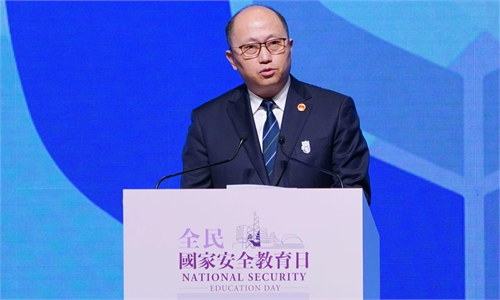
Photo: VCG
To watch or not to watch, that is never a question in China when it comes to chunwan, also known as the CCTV Spring Festival Gala. The TV show that airs on the China Central Television annually has become a tradition for tens of millions of Chinese families to welcome the Chinese Lunar New Year and is a must-have "seasoning" for Chinese New Year's Eve dinner.
"No matter if you watch it or not, it still becomes a part of your celebration and life. If a song is played at the gala, it can be heard everywhere the second day," 40-something Zhang Wei, who grew up in a village in Central China's Henan Province before moving to Shanghai, told the Global Times on Sunday.
"Using internet terms, it is equal to a viral post that gets billions of hits. Its popularity is hard to imagine today."
Chunwan debuted in 1983 when TV sets were very rare in China. It has been recognized by Guinness World Records as the world's most-watched TV program.
"I still remember that we had to gather in front of our village's only television to watch the show," Zhang recalled.
"We paid so much attention to every program in the gala that we talked about them even after returning to school two weeks later."
The first Spring Festival Gala was undoubtedly a big success. In an era when entertainment programs were relatively scarce and information dissemination was slow, the gala single-handedly brought together all parts of the country and all ethnic groups, as men, women and children gathered in front of the TV, filling the night with laughter and creating an unforgettable memory for people.
Memories of the times
From songs, dances to comedic crosstalk performances, each year's chunwan creates a classic show that is usually remembered for years and even decades. In 1987, the song "Fire in Winter" performed by Fei Xiang from the island of Taiwan ignited the hearts of people all over the country, making him a national idol overnight.
As the first Hong Kong actor on the gala's stage, singer Cheung Ming-man is still remembered for his patriotic song "My Chinese Heart." For 32-year-old Yuan Cheng, then just a 6-year-old boy in Hubei Province when he first heard the song in 1996, this was a doorway that introduced him to Hong Kong, a city where he eventually went to study and later settled down in.
"The song made its debut in 1984's chunwan before my birth. But it has influenced so many people for so many years, especially before Hong Kong's return to the motherland in 1997," Yuan recalled. "The song opened a window for a boy living in the mainland to visit the city one day. And here I am."
Many international stars like South Korean Lee Min-ho, Canadian-French singer Celine Dion and French actress Sophie Marceau have appeared at the gala, turning it into a stage for global audiences.
Entering the digital era
Along with China's burgeoning technology and digital media industries in recent years, the show that was once exclusive to cable TVs now streams on online platforms, not only its host CCTV.com, but also platforms like iQIYI and Douyin, China's Tiktok.
The transformation has enabled more people to watch the show no matter where they may be.
"I'll be traveling on my way home when it starts, but I will be able to watch it on my smart phone at the same time my grandma watches it on her TV," Na Mingming, an office lady in Beijing, told the Global Times.
Currently, iQIYI has already launched online pre-shows giving viewers teasers for the show such as looks at behind-the-scenes rehearsals.
Zhu Xun, a marketer in the digital media industry, told the Global Times that chunwan's digital transformation is "strategic" in that it can get younger generations involved in making "creative reproductions" of classic Chinese cultural IPs.
Bilibili, a Chinese video site where 78 percent of its users are between 18 to 35 years old, is currently crowded with chunwan-related memes and original videos. The content of these posts are extremely diverse, such as "predictions for 2023's crosstalk performance," "chunwan host makeup tutorial" and reproductions of assorted memes from the gala's classic song and dance performances.
Considering the interactive relationship between chunwan and its audience, the gala will never go out of fashion, Zhu said.
Still a fest for global audiences
Moreover, the "very Chinese" nature of the gala has also become a "lighthouse" guiding oversea Chinese home.
Once compared to "turkey at Thanksgiving," the gala is a symbol of overseas Chinese's "cultural roots" and a bridge that reconnects them with Chinese culture.
Chu Lihua, a 43-year-old mother with two multiracial boys living in the UK, told the Global Times that although some of the gala's content may be "too Chinese" for her boys who grew up in the UK to understand, they still enjoy watching the program. One time after watching the gala, the boys even turned to her and asked, "Mummy, can we travel to China over this summer break?"
"No matter where we are, or how our lifestyles have been Westernized, watching the Spring Festival gala at this special occasion is always part of my Chinese cultural identity," Chu said.
Even major Western online platforms, such as YouTube, stream the gala. The show airs in more than 170 countries and regions, including Russia, India and Belt and Road member Italy.
In 2021, more than 97,000 people watched the gala on Niconico, the largest video platform in Japan which hosts many overseas Chinese.
"To be honest, I was never that eager to watch it when I was home, but now that I'm abroad, I can't wait for it to begin… Maybe I just miss home too much," Yang Can, a Chinese student in Tokyo, told the Global Times.
According to the viewership ratings of the Spring Festival Gala for the years 2003-22, the 2004's gala received the highest rating at just over 40 percent share.
Due to the increased variety of shows in China, viewership of the gala over the past three years have been the lowest in its history. The average viewership for 2020-22 only reached a bit over 20 percent.




